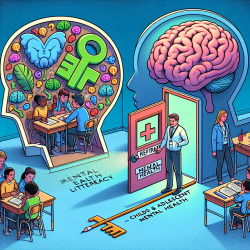As practitioners in the field of speech-language pathology, our ultimate goal is to create effective and evidence-based interventions that foster significant improvements in the lives of children. One critical area of focus is the development of reading skills in children with intellectual disabilities (ID). Recent research, such as the study titled Rapid automatized naming skills of children with intellectual disability by de Chambrier et al. (2021), provides valuable insights that can guide our practices.
Understanding Rapid Automatized Naming (RAN)
Rapid Automatized Naming (RAN) refers to the ability to quickly name a sequence of familiar visual stimuli, such as colors, objects, or letters. This seemingly simple task involves a complex interplay of cognitive processes, including attention, visual integration, phonological retrieval, and processing speed. The study by de Chambrier et al. (2021) aimed to compare the RAN skills of children with ID to those of typically developing (TD) children matched on phonological awareness (PA) and reading level.
Key Findings from the Study
The study revealed several important findings:
- Children with ID exhibited more domain-specific RAN skills and were significantly slower in most RAN tasks compared to their younger TD peers.
- No significant correlations were found between RAN tasks and age or IQ among children with ID, suggesting that RAN performance does not depend on the severity of the intellectual disability.
- The interrelations between different RAN tasks were weaker among children with ID, indicating that their RAN skills are more item-specific compared to TD children.
Implications for Practice
These findings have several practical implications for practitioners:
- Incorporate RAN Training: Given the significant role of RAN in reading development, incorporating RAN training into intervention programs could potentially enhance reading skills in children with ID. Studies have shown that RAN skills can be improved through targeted training.
- Focus on Domain-Specific Interventions: Since children with ID have more domain-specific RAN skills, interventions should be tailored to address specific areas of difficulty, such as color naming or object naming.
- Monitor Progress and Adapt Strategies: Regular assessment of RAN skills can help practitioners monitor progress and adapt intervention strategies to meet the evolving needs of each child.
Encouraging Further Research
While the study by de Chambrier et al. (2021) provides valuable insights, further research is needed to explore the longitudinal development of RAN skills in children with ID and to identify the most effective intervention strategies. Practitioners are encouraged to stay informed about the latest research and to contribute to the growing body of knowledge in this area.
To read the original research paper, please follow this link: Rapid automatized naming skills of children with intellectual disability.










